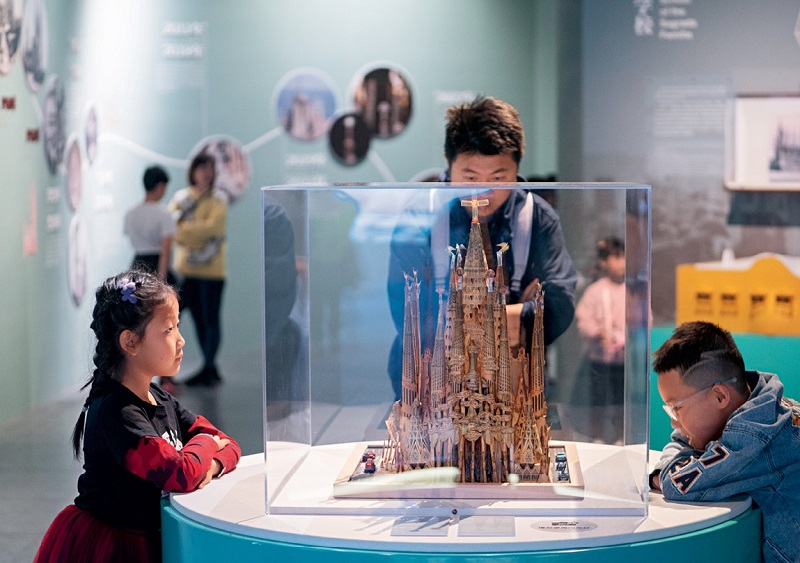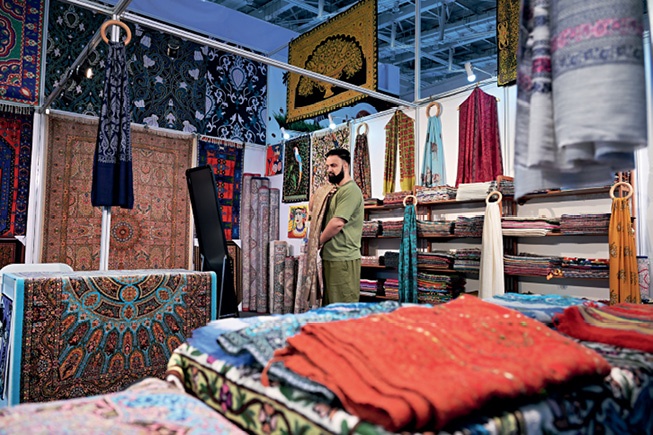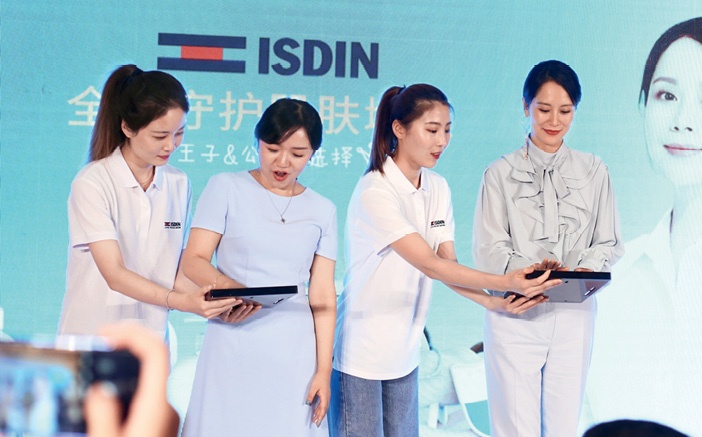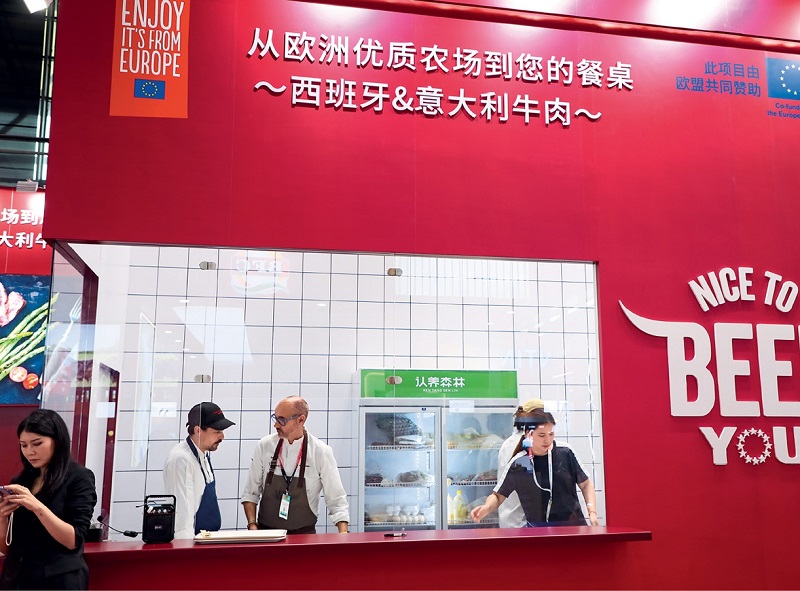
Inside the China Architecture Science and Technology Museum, visitors immerse themselves in the artistic world of legendary architect Antoni Gaudi at the exhibition “Gaudi: Moment Is Eternal” on May 4, 2024.
This year holds dual significance for EU-China ties, marking both the 20th anniversary of the comprehensive strategic partnership between Spain and China, and the 50th anniversary of diplomatic relations between the European Union and the People’s Republic of China. These milestones represent half a century of mutual understanding, cooperation, and openness between distinct cultures, development models, and worldviews – which rather than being adversarial, have grown to be increasingly complementary.
Yet the roots of these relationships run deeper than two or even five decades, nourished by longstanding friendships built through diverse forms of cooperation. I speak from direct experience. In 1978, as China embarked on the Deng Xiaoping-proposed reform and opening-up journey and began implementation of “socialism with Chinese characteristics,” I had the privilege of establishing the first Spanish commercial office in Beijing, one of the first European presences in China, to begin active, on-the-ground engagement.
The signing of the Spain-China comprehensive strategic partnership was a decisive step in this journey. Under this framework, China has become Spain’s most important trading partner outside the EU, while Spain is China’s fifth-largest EU trading partner. But beyond trade figures lies a shared strategic vision – one that Europe as a whole must now reaffirm with resolve.

The booth of Spanish Caprala handmade textile artworks during the 2025 China·Langfang International Economic and Trade Fair on June 16, 2025.
 A Historic Opportunity We Cannot Miss
A Historic Opportunity We Cannot MissThe 50th anniversary of EU-China diplomatic relations invites deep reflection on Europe’s future role globally. We stand at a geopolitical crossroads. Europe must choose whether to be a proactive, strategic actor on the world stage or a passive follower of external agendas.
A central unresolved issue in this relationship is the EU-China Comprehensive Agreement on Investment (CAI). Concluded technically in December 2020, after seven years of negotiations, the agreement remains unsigned and unratified, stalled for political reasons. This impasse represents a missed strategic opportunity – one that would have guaranteed European companies more access to the vast Chinese market and provide a robust legal framework for future cooperation.
Allowing this agreement to languish, held hostage by short-term tensions or third-party influence, would not only deprive key European sectors of economic opportunities, but also undermine the EU’s credibility as an autonomous, forward-thinking global player.
The European Union must pursue a foreign policy rooted in its own values and strategic interests. Its relationship with China – a central force for 21st-century development – should not be constrained by Cold War ideologies or confrontation-driven alliances. As the world evolves toward multipolarity, Europe should embrace its role as a champion of multilateralism, cooperation, and stability.
This is not a call to overlook differences or compromise principles. Rather, it is an argument for cultivating a relationship grounded in mutual respect, sustained dialogue, and pragmatic collaboration. Investing in ties with China is an investment in the future. Turning our backs on that relationship would be a geostrategic mistake of historic proportions.
The same holds true for Spain. Regardless of short-term political shifts, Spain’s foreign policy must be guided by a long-term strategic vision. Consistent and earnest engagement with China is not merely wise – it is necessary. Spain is uniquely positioned to serve as a privileged bridge between Europe and China, and should embrace this role with confidence and leadership.

Spanish brand Cumlaude Lab showcases its products at the China Beauty Expo in Shanghai on May 13, 2025.
Cooperation as the Foundation for Shared Progress
Over the decades, Spain-China cooperation has yielded tangible outcomes across multiple fields, bringing the two countries even closer.
Spain is a major supplier of pork to China, a trade relationship worth billions of euros annually. This cooperation directly addresses China’s demand for high-quality pork and is a cornerstone of their agricultural trade. Meanwhile, Spain is also one of the top wine exporters to the Chinese market. Organizations like the the Spanish Wine Interprofessional Organization (OIVE) actively promote Spanish wines through events and tastings across China, making Spanish wine a common sight in Chinese restaurants and stores.
In the commercial world, the brand Zara of the Spanish fashion giant Inditex is a quintessential example of successful market penetration. With hundreds of stores across China, it has not only generated hefty revenue but also influenced Chinese retail and fashion trends. Its online integration with platforms like Tmall and JD.com demonstrates deep market adaptation.
In the banking sector, Banco Bilbao Vizcaya Argentaria (BBVA) has been a long-term strategic investor in China’s CITIC Bank. This financial partnership has facilitated cross-border investments and financial services for businesses operating in both markets.
Meanwhile, the infrastructure and logistics sector has also witnessed the two countries’ strengthened cooperation. The Chinese shipping giant COSCO Shipping has acquired a 51-percent stake in Spain's largest maritime terminal operator, Noatum Ports, which operates the largest container terminal at the Port of Valencia, one of the busiest ports in the Mediterranean and Europe.
The Spanish wind turbine manufacturer Siemens Gamesa has been a major player in China’s wind energy boom for years, supplying technology and components for numerous wind farms across the country, contributing significantly to China’s renewable energy capacity.

Chinese actress Hai Qing attends a brand event for the Spanish skincare brand ISDIN in Shanghai on September 12, 2020.
Yet, the two countries’ cooperation goes beyond the business sector. Bilateral cultural and people-to-people exchanges have strengthened their bond. In 2023, the special exhibition “The Greats of Six Centuries: Masterpieces from the Museo Nacional Thyssen-Bornemisza” held at the Museum of Art Pudong (MAP) in Shanghai provided Chinese audiences with profound insight into the evolution of Western culture, lifestyle, and social landscapes over the last 600 years. It comprised a selection of 70 paintings from Spain’s Museo Nacional Thyssen-Bornemisza.
Another significant recent cultural milestone was the opening of the Shanghai Cervantes Institute in September 2024. This is the second such institute in China, following the one in Beijing (established in 2006). Spanish Prime Minister Pedro Sánchez personally attended the inauguration. This expansion highlights the growing interest in Spanish language and culture in China, with nearly 60,000 students learning Spanish through formal and informal channels. The Shanghai Cervantes Institute hosted the exhibition “Wandering Imaginations: Modern Reveries in Early 20th-Century Travel Posters” during March-May 2025. It showcased Spanish travel posters from the 1920s-1940s alongside poetry, also featuring Chinese posters and poems from the same era.
The increasingly frequent bilateral cultural exhibitions and artistic exchanges have greatly promoted people’s understanding of each other’s history, culture and society.
Now it is Spanish companies that journey to China to learn, partner, and invite Chinese firms to invest in Spain. Through decades of engagement, we have come to understand something essential: China may be a different world, with distinct values and perspectives, but it shares the same aspiration for shared prosperity and peace.

The SIAL China International Food Exhibition is held in Shanghai on May 20, 2025, showcasing imported meats, including European and Spanish beef.
The Way Forward: Dialogue Over Division
At the Cátedra China Foundation (China Chair Foundation), established in Spain to foster understanding of this dynamic nation, China, we work to counter disinformation campaigns propagated by certain Western media and to promote informed, balanced dialogue between our societies. We are proud to count on the support of Spanish and Chinese companies committed to this shared vision.
China approaches strategic cooperation with a long-term perspective. And so do we. There is no progress without cooperation, no peace without dialogue, and no future without mutual respect.
This is the mission we pursue at the Cátedra China Foundation. And we call upon all institutions, associations, and governments that share our vision to join us in building a world where no single power dominates – a world that’s based on equality, dialogue, multilateralism, and lasting peace. 
MARCELO MUÑOZ is president of the Spain-based Cátedra China Foundation (China Chair Foundation), who was granted the title of the Friendship Ambassador to China by the Chinese government in 2024.